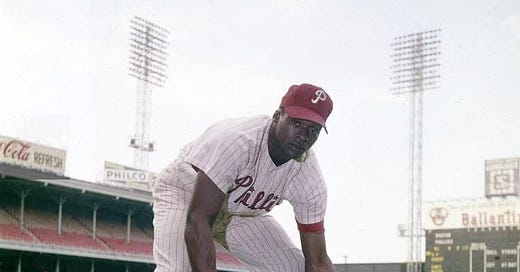Richie (Dick) Allen made it to Cooperstown!
Probably the most talented player who was not in the Hall of Fame!
I originally wrote this post on Saturday bemoaning reports that Dick Allen had again fallen one short vote of being elected to the Hall of Fame by the “Golden Era Committee”. Apparently that story was based on the 2021 vote. Lo and behold, on Sunday Allen won election through the apparently re-named “Classic Era Committee.”
Sorry for the confusion, but I am overjoyed that Allen is finally receiving the recognition he has long deserved. I don't follow MLB much anymore, but mainly due to my Mother, I was raised as a Philadelphia Phillies Fanatic,
The Kid from Wampum, Pa was National League Rookie of The Year playing for the Phillies in 1964, a year in which he led the league in Runs, Triples, Extra Base Hits and Total Bases and nearly led his team to a National League pennant before the infamous and heartbreaking late-season collapse by the team. Most fans blamed Manager Gene Mauch for panicking and starting his pitchers out of rotation in a desperate attempt to stem what ended up being a 10-game losing streak in September, after the team led the league for the entire season.
Allen ended up a 7-time All-Star in his 14-year career with 5 Major League teams. He was also American League MVP in 1972 and led the league twice in Home Runs on the way to compiling 351 lifetime dingers, putting him 99th on the all-time list.
I was in Connie Mack Stadium on May 29, 1965, the night that "Richie" Allen, as I knew him, hit a home run over the Coke sign on the roof of the upper deck in left field. (See photo) Almost 60 years later, I can still see that ball disappearing into the night. I’m not sure if it has come down yet!
That home run was estimated to have traveled 529 feet and caused the Pirate's Willie Stargell to famously comment, "Now I know why the Phillies fans booed him, when he hits a home run, there are no souvenirs!" That blast, in an Era when the baseballs were not as lively as today, is one of the longest in MLB history!
Despite his great slugging, Richie was treated badly by the notorious Boo Birds of Philadelphia. In 1965 he was involved in a pre-game altercation with racist teammate Frank Thomas who allegedly hit Allen with a bat. Thomas was suspended from the team, but in that less enlightened time, the interracial nature of the violence caused many fans to turn against Allen as they blamed him for causing “a white man to lose his job.”
That was not Allen’s first brush with racism in baseball. The year before he was called up to the Majors, he was assigned to the Little Rock Travelers farm team. Arkansas in 1963 was still being governed by racist Governor Orval Faubus, who a few years earlier had called in the National Guard to prevent the court-ordered integration of Little Rock High School.
Needless to say a lot of the local fans were not happy with the first black player to play for the team. He was greeted with death threats and racist signs such as “Nigger go home,” when he arrived at the airport and at his first night playing for the team. Despite that, he played well enough to be voted by fans as MVP of the team when he batted .289 with 33 home runs before finally being called up by the Phillies in September.
Allen always had bad relations with the press. A particular point of conflict was the nickname “Richie” which the Phillies insisted he be called. He never liked the name and was angry at the press for calling him by what he considered a little boy’s name. Finally, after demanding to be traded in 1970, he played out the rest of his career as simply “Dick” Allen.
Actually Allen had been angling to be traded for some time. Between injuries and suspensions for rules violations he missed a lot of games in his Philadelphia career. His managers and even some of his fellow players felt that at least some of the problems were intentional.
What was real was that his career nearly ended prematurely in 1967 when he badly injured his throwing hand when it broke the glass on the headlight of a car he was trying to push. He severed tendons and nerves in his fingers and underwent a 5-hour operation to try to repair the damage. He missed the last 40 games of that season and his throwing was never the same. After that he never played 3rd base again.
Suspicion and rumors surrounded that injury, with some reports that he had actually been injured in a bar fight. In any case, the incident did nothing to endear him to the press, the fans, his teammates or management.
It’s hard to know how big the numbers that Dick Allen might have been able to put up without all his well-documented problems. As a natural born talent he was among the best to ever play the game. Perhaps starting his career in Philadelphia, a notoriously racist city that had been the last in the National League to employ black players, didn’t give him a fair chance.
Thanks to the Classic Era Committee for finally doing the right thing. Now can you please put Pete Rose in too?




